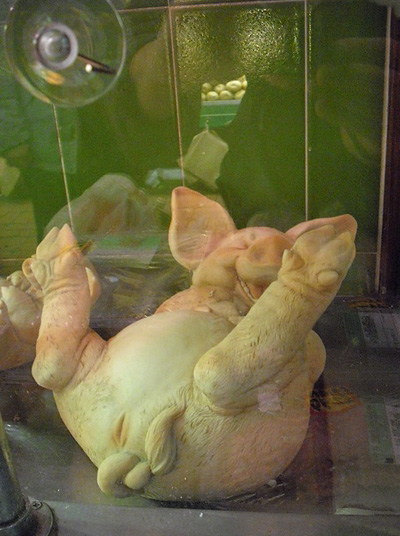You have no items in your cart. Want to get some nice things?
Go shopping Twice this week I’ve thought about “Pig” by Roald Dahl (which you can find in his compilation Kiss Kiss). The first because of the various columns in the newspapers talking about Anne Fine’s claim that children’s literature is getting too bleak and gritty, and second because of an explicit mention of it in a fascinating book I’m reading called I Am A Strange Loop. The author of this book, Douglas Hofstadter, was so influenced by Dahl’s “Pig” that he cites it as a contributing factor in his decision to turn vegetarian. If you haven’t come across “Pig” before, this might give you a clue as to where this story takes you. It’s very macabre, very bloodthirsty. It was written for adults, not children (so it would be unfair to use it in the current debate about kids’ books). To get a flavour of the tone, imagine how dark and grisly Dahl’s children’s stories are, then imagine what those stories would be like if bad old Roald didn’t have to hold back for the sake of the parents.
Twice this week I’ve thought about “Pig” by Roald Dahl (which you can find in his compilation Kiss Kiss). The first because of the various columns in the newspapers talking about Anne Fine’s claim that children’s literature is getting too bleak and gritty, and second because of an explicit mention of it in a fascinating book I’m reading called I Am A Strange Loop. The author of this book, Douglas Hofstadter, was so influenced by Dahl’s “Pig” that he cites it as a contributing factor in his decision to turn vegetarian. If you haven’t come across “Pig” before, this might give you a clue as to where this story takes you. It’s very macabre, very bloodthirsty. It was written for adults, not children (so it would be unfair to use it in the current debate about kids’ books). To get a flavour of the tone, imagine how dark and grisly Dahl’s children’s stories are, then imagine what those stories would be like if bad old Roald didn’t have to hold back for the sake of the parents.
To sum up (and give away what happens, I’m afraid—skip this paragraph if you don’t want to know): a sweet-natured boy, Lexington, is raised in isolation by his gentle and elderly great-aunt after his horrible parents are shot dead by the police. The urban world Aunt Glosspan takes him away from is depicted as a brutal one, in which every citizen is out for themselves and themselves alone. Glosspan brings Lexington up in isolation in the Blue Ridge Mountains as a vegetarian, and instils in him a love for cooking. He invents recipe after recipe, until he’s created over nine thousand. After his great-aunt’s death he sets off to the city to try to sell his recipe book to a publisher. His sweetness and naivety lead him to eat meat for the first time, and so astonished is he by its delicious taste that he visits a slaughterhouse to find out how pork chops are made. In the slaughterhouse something bad happens to him. You can probably guess what by combining the function of the place with Hofstadter’s decision to adopt vegetarianism.
“Pig” is like the twisted offspring of Kafka’s “In The Penal Colony” and Jonathan Swift’s “A Modest Proposal”. The story isn’t really about meat-eating, nor does it push a specific vegetarian agenda. Instead, it’s a satire—a warning against the bureaucracy and selfishness that can tear people apart. “Pig”, like both those aforementioned pieces, makes fabulous use of the grotesque, horrifying you at the same time as it makes you laugh. It reminds me of fairy stories, too—of the sudden acts of brutality that crop up again and again in the works of the Brothers Grimm and company. Stuff like this is going to happen, these stories seem to instruct their younger readers. Like a fairy story told by an expert storyteller around a crackling campfire in sinister woods, “Pig” has a wickedly juicy tone. If you decide to seek it out, first warm yourself up with Dahl’s reading of his version of Little Red Riding Hood here, then try to listen to Dahl’s nasal, slightly creepy intonation as you read “Pig”.

About Ali Shaw
Ali Shaw is the author of the novels The Man who Rained and The Girl with Glass Feet, which won the Desmond Elliot Prize and was shortlisted for the Costa First Book Award. He is currently at work on his third novel.




